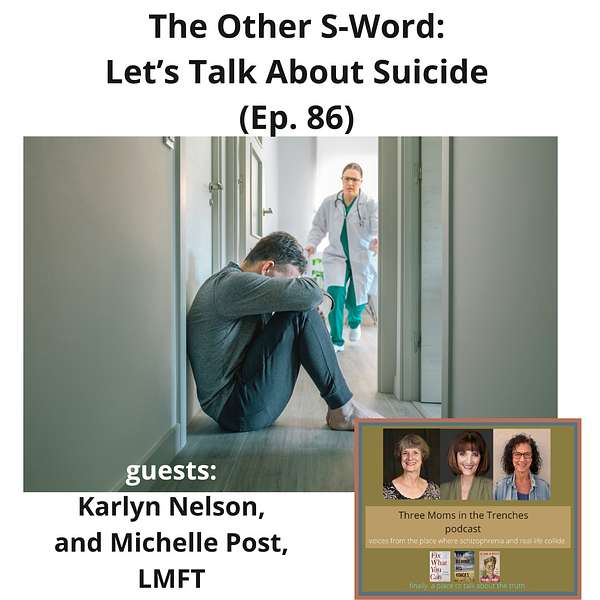
Schizophrenia: Three Moms in the Trenches
Schizophrenia in the Family. How do we cope? How can we help? We each have adult sons with schizophrenia and have written acclaimed books about it. We say it like it is, to help families, practitioners and those with SMI (serious mental illness) feel less alone...and learn. Randye Kaye, Mindy Greiling, Miriam Feldman...and guests.
Schizophrenia: Three Moms in the Trenches
The Other S-Word: Let’s Talk About Suicide (Ep.86)
Send a Text to the Moms - please include your contact info if you want a response. thanks!
Guests are: Karlyn Nelson and Michelle Post
Karlyn Nelson
Survivor of Suicide Loss | Breast Cancer Warrior | Realtor
Michelle Post, M.A., is a Licensed Marriage and Family Therapist (MFC 40198) with nearly 20 years of experience providing counseling and psychotherapy to clients in the greater Los Angeles area
According to the NIMH, People with schizophrenia have a much higher rate of suicide than the larger population: People with schizophrenia have a 10% rate of suicide compared with the larger population’s 1.3%rate of suicide.
Suicide is the biggest reason for the decreased life expectancy of people with schizophrenia.
A larger number of people with schizophrenia contemplate suicide. Around 40–79% of people with schizophrenia have reported having suicidal thoughts.
Saddest fact is that it is at the time of improved insight that most attempts are made. ie. when the person has finally moved past anosognosia and realizes his plight it is with improved understanding that this decision is made.
We Ask:
- What is an “emotional heart attack”/
- What are "The Five Things" when dealing with suicide loss in the family?:
- Get help yourself (best indicator of how well a child does after the death of a parent is how well the surviving parent copes… so if only one can get help, needs to be the parent).
- Use truthful and clear info about the cause of death and explain it in child terms – let the child lead with questions – do not over load them with info. They will need different info as they age
- Acknowledge and validate a child’s feelings
- Reassure them they are not to blame
- Address their fears and anxieties
- Encourage them to continue routine activities, structure gives them a sense of security
- Include them in as many memorial / activities around the illness, injury, and death as they choose.
- Prepare them
- Let them make an informed decision
- Share info and allow participation
- Debrief with them.
3. What can be done for suicide prevention?
LINKS:
Suicide hotline: 988
https://postfamilycounseling.com/
https://www.instagram.com/karlynnelson/
https://didihirsch.org/wp-content/uploads/Manual_for_Suppor
Want to know more?
Join our facebook page
Our websites:
Randye Kaye
Mindy Greiling
Miriam (Mimi) Feldman
.jpg)

